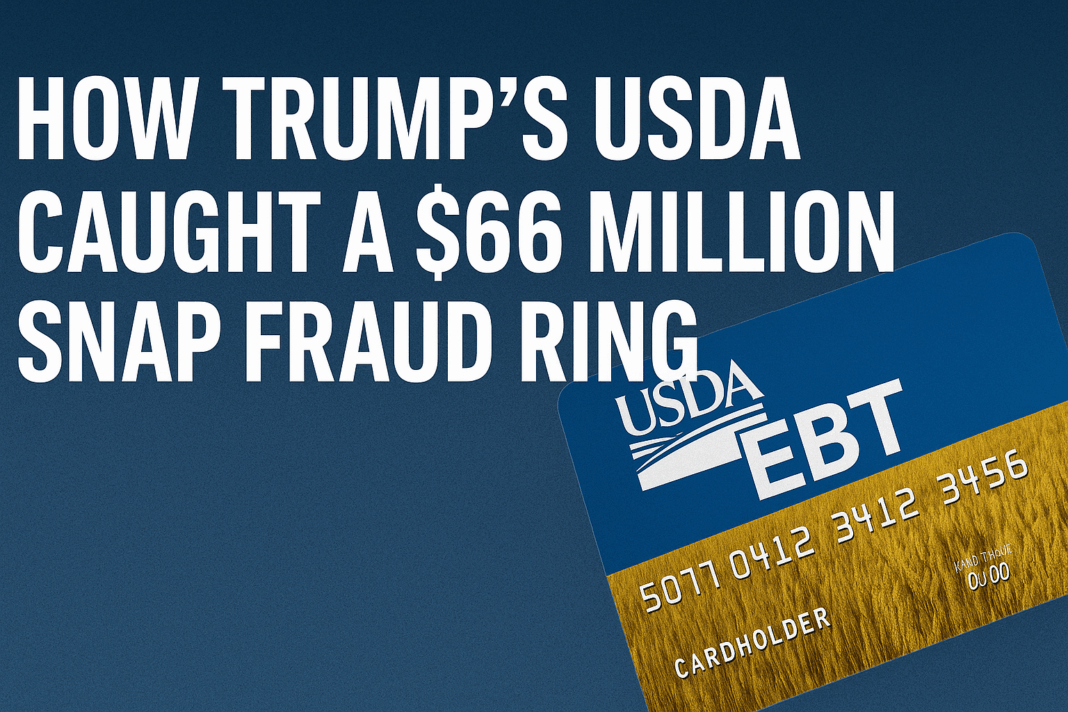A whistleblower, insider betrayal, and a trail of fake food stamp terminals lead to one of the largest anti-poverty scams in U.S. history
- The SNAP fraud case involves six people accused of misusing over $66 million in food aid funds.
- A USDA employee, Arlasa Davis, allegedly sold license data to the fraud ring for bribes.
- The investigation began under the Trump administration’s USDA anti-fraud division.
- 160 unauthorized EBT terminals were deployed across NYC for illicit transactions.
- Federal prosecutors say this is one of the largest food stamp frauds in U.S. history.
The scheme was elaborate, quiet, and devastating. It started small—one unauthorized card terminal in a corner shop—but ballooned into a $66 million food stamp fraud conspiracy that infiltrated federal systems and exploited the very programs meant to feed America’s poorest families.
Now, thanks to a sweeping federal investigation first initiated during President Donald Trump’s administration, the inner workings of that scheme have been exposed—along with the betrayal of a trusted government employee at the heart of it.
The Tip That Sparked It All
Investigators at the U.S. Department of Agriculture (USDA) had been watching for suspicious patterns: grocery stores that never sold groceries, but processed massive amounts of SNAP benefits; license applications from smoke shops claiming to sell fresh produce; red flags blinking across systems designed to ensure food stamps were used properly.
Behind the anomaly was Michael Kehoe, a Long Island man who, prosecutors say, orchestrated the deployment of more than 160 unauthorized Electronic Benefit Transfer (EBT) terminals to New York area shops that had no right to operate them. From 2019 onward, these terminals processed millions in fraudulent SNAP redemptions—taxpayer money redirected away from families in need.
The USDA Insider Who Opened the Door
The case may never have grown so large without a leak from inside. That leak, prosecutors now say, was Arlasa Davis, a veteran USDA employee assigned to fraud detection. With access to internal license data, she used her personal cellphone to photograph hundreds of EBT license numbers and funneled them to conspirators.
Those codes—normally used to authorize legitimate stores—were sold to middlemen and applied to fake businesses. The fraud ring used them to activate EBT terminals at ineligible locations, processing over $36 million in fraudulent transactions through this backdoor access alone.
Paperwork, Bribes, and “Birthday Gifts”
To hide the bribery, Davis and her associates disguised payments in friendly terms—“birthday gifts,” “flowers,” and vague “thank-you’s.” But the paper trail told a different story. Phone messages, financial records, and surveillance unraveled how government access had become a tool for profit.
Alongside Kehoe and Davis, four others were indicted: Mohamad Nawafleh, Omar Alrawashdeh, Emad Alrawashdeh, and Gamal Obaid, all based in the Bronx. According to prosecutors, they operated the network’s logistics—applying for licenses with forged documents, wiring money, and running the unauthorized terminals.
Criminal Charges and What’s Next
The six defendants face a long list of federal charges, including:
- Conspiracy to steal government funds
- Theft of government funds
- Misappropriation of USDA benefits
- Bribery and honest services wire fraud (for Davis)
Each of these charges carries a potential sentence of five to twenty years in prison. The defendants are presumed innocent until proven guilty in court. The case is assigned to Judge Jed S. Rakoff in the Southern District of New York.
The Trump USDA’s Role
This federal crackdown was launched by the USDA’s Office of Inspector General under the Trump administration’s directive to intensify anti-fraud operations in public benefit programs. The investigative team included agents from USDA-OIG, the FBI, and prosecutors from the U.S. Attorney’s General Crimes Unit.
Though the scheme continued beyond Trump’s term, the mechanisms that uncovered it were built into a policy push emphasizing “accountability in welfare programs”—a mantra used by Trump officials to tighten oversight on SNAP.
Conclusion
In the end, the $66 million wasn’t stolen all at once—it was skimmed slowly, quietly, from the corners of a system designed to nourish families in need. This case, now unfolding in federal court, is a test of how well government can protect its most vulnerable—and how swiftly it can respond when that trust is betrayed from within.
Also Read:
- Ukraine-Russia Peace Talks Overshadowed by Drone Strikes
- Trump Administration Proposes Rule to Fast-Track Firing of Federal Workers for Misconduct
- Plagiarism in Nepali Media: An Ethics Call
(with inputs from U.S. Attorney’s Office – SDNY, USDA OIG, and FBI)
Virginia Times – Your Trusted Media
A global media for the latest news, entertainment, music fashion, and more.














